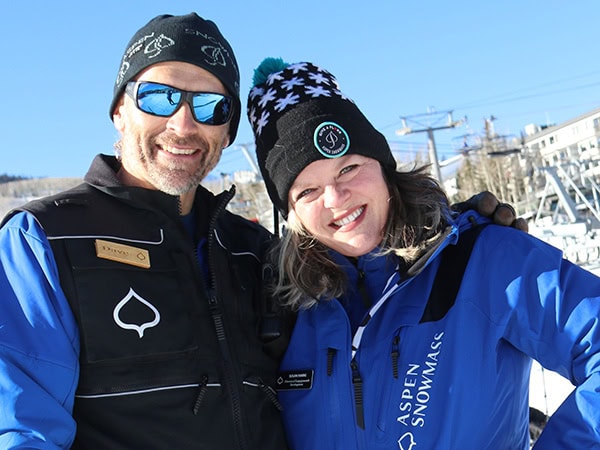The Daniels College of Business program is geared toward professionals looking to break into or advance in the outdoor recreation industry

David Gray and Susan Harig
Over the course of 28 years, David Gray climbed the ranks at Aspen Snowmass (now part of Aspen One), from seasonal employee to director of lift operations and guest services.
Over the course of 18 months in the University of Denver’s Leadership in the Outdoor Recreation Industry (LORI) program, he learned he still has plenty of terrain to ascend.
“It was eye-opening to see that the outdoor industry is [so] big and the ski industry that we spend our time and energy in is actually only [a small part of it],” Gray said of the Daniels College of Business graduate certificate he recently completed. “It showed how much more there is to learn in the industry. I can still become a better leader, I can still become a better manager, I can still become better at my role.”
Gray and his colleague, Susan Harig, are among the first students to complete the LORI certificate, a program designed to help newer professionals break into the $1 trillion outdoor industry and broaden the perspectives of those who have a resume full of experience.
The University of Denver began building the program in 2023—the result of a partnership with the VF Foundation, an arm of the company behind Vans, The North Face, JanSport, Dickies and more. Daniels, the Josef Korbel School of International Studies, and the Sturm College of Law collaborated to design the innovative curriculum, composed of 10 core courses and a series of track-specific electives. All are offered online in an intensive, five-week “Sprint” format.
“This program is really designed for working professionals who want to get into the industry or advance in the industry,” said Chris Castilian, the program’s senior executive director. “We are entirely focused on getting our students employed in their dream jobs, so we take full advantage of opportunities to make connections, get them placed and help them find their pathway to the outdoors.”
Diversifying the outdoor industry
As Aspen One’s senior director of engagement and learning, Susan Harig initially enrolled in LORI so she could experience the professional development program she was overseeing.
“The learning and development I provide is more geared toward leadership development and some business awareness,” Harig said, “but this was a much deeper dive into the business acumen of the outdoor industry.”
One of her favorite classes, Access to the Outdoor Industry, changed the way she thought about inclusivity. Guest speakers and in-class discussions uncovered things she had never considered. The curriculum covered policies that are intended to welcome people who have not traditionally had the opportunities to participate in the outdoor industry.
Ultimately, LORI is designed to create a more diverse, equitable and inclusive sector, where all professionals have access to the skills and leadership training they need to succeed in the outdoor industry. As a result, 100% of LORI students receive merit- and/or need-based scholarships, which cover 10-90% of tuition.
Castilian said LORI is also making significant inroads into recruiting a diverse population. About half of current students are female, 20% are students of color and 20% identify as part of the LGBTQIA+ community.
‘An investment in our success’
LORI students also come from a wide range of professional backgrounds, industries and career stages.
“We had a very talented group of leaders, managers, students going through this, so everyone was bringing their own ideas and experiences,” Gray said.
The result was a tight-knit cohort that connected as much with faculty and guest speakers as they did with one another. A roster of accomplished adjuncts bring perspective from big-name organizations like Vail, Woodward and the Outdoor Recreation Roundtable.
“They were rooting for us,” Harig said, “and they were saying, ‘Let me know how we can support you in your career.’ They connected with us on LinkedIn. There seemed to be an investment in our success, even in the four or five short weeks we were in a class.”
Castilian says he has intentionally picked professors with significant industry expertise and huge networks, who are willing to share them with the people in their classrooms. Already, he can tell a story of how one of his faculty helped make an introduction for a student, who landed what she calls her dream job.

Chris Castilian
Opportunities for corporate partnership
Many of the students in LORI’s first cohorts have attended the program with help from their employer. Aspen One, for example, enrolled 16 of its employees. There are opportunities for other companies to follow suit.
“Retention is a challenge for a lot of companies in the outdoor industry,” Castilian said. “[Aspen One is] investing in their employees to give them upward mobility in their jobs, to keep hem challenged and happy with their career growth. They’ve made a very intentional, deliberate effort to keep their folks challenged when moving up the corporate ladder.”
From Gray and Harig’s perspectives, the investment is already paying dividends.
“Even though I’ve been in my current role for close to 10 years, I’m not an expert in all of it,” Gray said. “The things we’ve learned can be applied in so many different ways. I have this knowledge bank that I can reference when something comes up.”
Harig agreed.
“I feel like I’m asking better questions now,” she said. “I have enough knowledge to know I don’t know everything, but I know how to frame up questions to the people that do. I know that will serve me and my colleagues well. We’re not going in with the expertise, but we’re going in with enough to push a conversation.”
